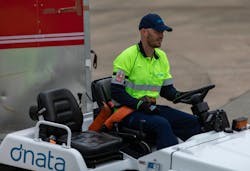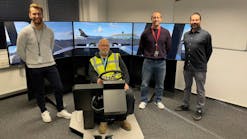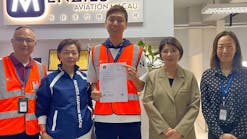The Necessity of Skilled Handlers
In the last couple of years, the COVID-19 pandemic has significantly affected the aircraft ground handling industry. Indeed, border restrictions have made travel more difficult, and this has had several knock-on effects. This has been true also in the Asia-Pacific region.
With the reduction in the volume of passenger flights, aircraft ground handling companies have had to cope with challenges pertaining to skill retention, among others.
Although the demand for passenger flights has been reduced due to the pandemic, it is essential to maintain skilled employees in certain areas because cargo flights have soared, observes Doohyuk Im, managing director of ground handling for Swissport at Incheon.
“We must also retain skills and experience in our team for the post-pandemic surge in passenger flying,” he says.
Ground handling organizations have been introducing measures to manage the reduction in business with many having utilized furlough schemes, long-term leave and reduced hours, according to officials at Universal Aviation, resulting in staff working intermittently. The reduction in traffic can result in a weakening of proficiency due to the lack of opportunities to consistently apply their skills.
“This can lead to a poor customer experience and an increased exposure to risk on the ramp for everyone,” say Razali B. Abdul Rahim, operations manager at Universal Aviation Singapore, Fabian Cyril Gimson, local safety and training coordinator at Universal Aviation Singapore, and Simon Wade, head of international safety at Universal Aviation.
Importance of Skill Retention
According to Christopher Barker, Swissport Japan’s head of quality, health, safety and environment (QHSE) and training, skill retention is important as a skilled, experienced workforce can deliver high quality, safe service in line with customer requirements.
“During the COVID-19 pandemic, many staff have been dispatched elsewhere or working sporadically, so it is important to keep staff skills and knowledge up to date,” he says. “With staff returning from extended operational absences, skill refresher training is essential to maintain safety and quality standards.”
Indeed, skill retention is very important from the perspective of the ground handling operator and aircraft safety, observe officials in the ground handling department of Japan Airlines.
“In terms of skills, in addition to the operation of vehicles and equipment, a correct understanding of work procedures and sensitivity to hazards in the work environment are also important,” say Japan Airlines ground handling officials.
Skill retention is vital across all areas of ground handling, according to Steve Clark, head of global training at dnata.
“The ability of our personnel to perform their operational functions in a safe, competent manner is crucial to ensuring we remain operationally effective, achieve our required business outputs and continue to meet and exceed our customers’ expectations,” he says.
It is essential to understand skill levels and ensure sufficient skilled staff are available to cover for any unexpected contingencies, affirms Barker.
“With flight schedules still uncertain, flexibility is required to ensure skilled staff can fulfill customer handling requirements and that safety-critical functions are well covered,” he says.
Losing experienced staff or having poorly trained staff affects the overall customer service aspects of the business. The most important area is frontline ramp and line services, according to Rahim, Gimson and Wade.
“This work involves the interaction of people, ground support equipment and vehicles close to very expensive aircraft, and it is vital that beyond just standard operating procedures (SOPs), frontline personnel are consistently competent in working in such a high-risk environment,” they say. “This reduction in skills may not be limited to frontline staff and can include instructors providing training, which can then inhibit the enhancement of proficiency or expertise. If risks are not mitigated, the resulting effect can be far more severe to both man and machine.”
The pandemic has provided additional challenges to the aircraft ground handling business, affirms Clark.
“However, as part of our recovery we have ensured that all our returning personnel receive all required refresher trainings, and then actively demonstrate they are at the required standard of competence before they return to the operation. This way we can ensure that the skills and competences of our personnel remain at the required, high standard,” he says. “Safety is obviously a top priority; therefore, we must ensure that all personnel adhere to all safety protocols and SOPs as they carry out their operational roles.”
Peculiarities of Ground Handling
Skill retention is an ongoing challenge for the ground handling industry and one which has been exacerbated by the COVID-19 pandemic and the uncertainty faced by the aviation sector, according to Barker.
“While ground handling is, for many, an excellent career path with diverse, interesting work and strong development opportunities, employees can also be challenged by work which can be shift-based, labor-intensive and performed outside in all weather conditions,” he says.
A key aspect of high personnel turnover with respect to skill retention is the loss of knowledge and experience, especially for long-serving personnel, according to Rahim, Gimson and Wade.
“This is detrimental in maintaining good standards. Regular customers can recognize this shortfall in their interactions and may reconsider the need to stay loyal. High staff turnover can lead to a direct increase in providing training to on-board new staff, upscale existing skills or to get current staff to take on additional roles,” they say.
Aircraft ground handling companies have to ensure that training systems are set up and resourced to deliver the required training to any new joiners, according to Clark.
“The focus must be on the development and assurance of safe operational competence prior to being released to live operations. We must also remain flexible in terms of personnel coming into the business with any identified prior experience, i.e., not necessarily delivering the full initial training program for their role, but potentially conducting the relevant practical assessments to confirm they are also at the required competence level to perform the operational tasks safely and with confidence,” he says. “Leveraging established best practice from one part of the business provides us an opportunity to realize efficiencies across the rest of our business. This is part of our dnata ‘onetraining’ approach designed to deliver the highest degrees of operational effectiveness in the most efficient manner possible.”
What Influences Skill Retention
Motivation and mental health well-being are other key factors influencing skill retention, say Rahim, Gimson and Wade.
“There is a level of uncertainty or fear that can drive a staff member to lose interest in providing his/her best efforts. Aspects such as job security and exposing themselves and their families to COVID infection does play on their mind, affecting mental health and concentration at work,” they say. “Less opportunities to put into practice skills regularly and improve skillsets can result in errors, mistakes or even violations which can have a negative effect on personnel, aircraft and equipment.”
Currently, among the main factors that influence skill retention in the aircraft ground handling business is the low number of flights currently operated.
“The decrease in opportunities to perform ground handling operations had a significant impact on maintaining skills,” say Japan Airlines ground handling officials.
Indeed, the key factor affecting skill retention has been extended absences from the operation, according to Barker.
“There can also be difficulties with accessing opportunities to employ practical skills in operations following training, and it has been more important than ever to actively encourage engagement with, and effectiveness of, recurrent training,” he says.
Strategies and Tactics to Support Skill Retention
From a training perspective, the use of micro-learning nuggets and increased exploitation of digital technologies to continually reinforce certain messages or requirements on an ongoing basis can help support skill retention, according to Clark.
“Training should not just be seen as an activity undertaken during onboarding, and then again every 36 months as a requirement for formal recurrency, but as being embedded within the operational lifecycle,” he says. “This will reduce the training burden placed on operations and therefore should increase operational effectiveness and efficiency.”
According to Rahim, Gimson and Wade, the use of live drills and scenario programs enable staff to practice regularly helping to retain knowledge and competence.
“Drills can help trainers detect complacency and reinforce correct operating procedures and can provide a good opportunity to expose and test staff to emergencies or abnormal situations,” they say.
Another way to reduce the likelihood of skill decay is through close tracking/monitoring of individual work exposure by recording how many handling or towing operations has a staff member performed in a month, point out Rahim, Gimson and Wade.
“If operatives have not had a chance to practice their skills in the last month, it would be good to ensure the staff undergo some form of refresher. In case of longer leaves, they can undergo a refresher with a short on-the-job stint, followed by a certification by a supervisory staff,” they say.
Swissport focuses on targeted skill development programs in which employees can drive their own professional development and the company can target skill gaps, affirms Barker.
“Improved on-the-job coaching processes are also important, as are increasing operational assessments and breaking down recurrent training into small ‘bite-sized’ modules that are delivered more frequently. Skilled employees can also be retained by focusing on work conditions and rewards,” he says.
Continuous Improvement
It is important that organizations constantly look for ways to improve the proficiency and competence of their staff to reduce risk and mitigate the hazards present in such a varied and time-critical sector, according to Rahim, Gimson and Wade.
“By driving risk down, organizations can improve staff retention and, by doing so, can maintain their overall skillset thus reducing the risk to the aircraft and clients performing their critical missions,” they say.
According to Clark, there needs to be focus on the ongoing maintenance of operational competence, such as conducting informal observation and assessment of operational performance on a routine and regular basis.
“This can be done as part of standard leadership or safety walkarounds and should ensure that the ground handling activities continue to be performed against the organization’s SOPs and safety standards, and therefore that the required skills/competences have been maintained,” he says. “Data gathered through activities such as audits, safety inspections and incident management procedures can also be used to identify whether there may be gaps in skill or competence. Any identified gaps can then be quickly rectified through a relevant and targeted improvement plan, again ensuring that the required skills and competences are maintained at the level needed for operational effectiveness.”
Together with skill retention, it is important that organizations implement and follow a structured safety management system, according to Rahim, Gimson and Wade.
“Universal Singapore have recently been awarded Stage 3 certification under the International Standard for Business Aircraft Handling (IS-BAH). By achieving this certification, organizations such as Universal, can demonstrate their commitment to safety, quality and training in a documented and consistent manner,” they conclude.






